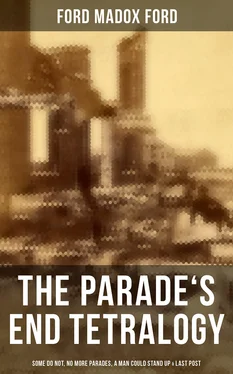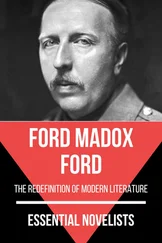Tietjens said:
‘It’s all right, Macmaster will be splendid. We had a friend up at Cambridge with your husband’s tendencies, and Macmaster could get him through any social occasion . . . Besides, we’re all gentlefolk here!’
He had seen the Rev. Mr Horsley and Mrs Wannop both interested in their plates. Of Miss Wannop he was not so certain. He had caught, bent obviously on himself, from large, blue eyes, a glance that was evidently appealing. He said to himself: ‘She must be in the secret. She’s appealing to me not to show emotion and upset the applecart I It is a shame that she should be here: a girl!’ and into his answering glance he threw the message: ‘It’s all right as far as this end of the table is concerned.’
But Mrs Duchemin had felt come into herself a little stiffening of morale. Macmaster by now knew the worst; Duchemin was quoting snufffingly to him the hot licentiousness of the Trimalchio of Petronius; snuffling into Macmaster’s ear. She caught the phrase: Froturianas, puer callide . . . Duchemin, holding her wrist with the painful force of the maniac, had translated it to her over and over again . . . No doubt, that too, this hateful man beside her would have guessed!
She said: ‘Of course we should be all gentlefolk here. One naturally arranges that . . . ’
Tietjens began to say:
‘Ah! But it isn’t easy to arrange nowadays. All sorts of bounders get into all sorts of holies of holies!’
Mrs Duchemin turned her back on him right in the middle of his sentence. She devoured Macmaster’s face with her eyes, in an infinite sense of calm.
Macmaster four minutes before had been the only one to see the entrance, from a small panelled door that had behind it another of green baize, of the Rev. Mr Duchemin, and following him a man whom Macmaster, too, recognized at once as Parry, the ex-prize-fighter. It flashed through his mind at once that this was an extraordinary conjunction. It flashed through his mind, too, that it was extraordinary that anyone so ecstatically handsome as Mrs Duchemin’s husband should not have earned high preferment in a Church always hungry for male beauty. Mr Duchemin was extremely tall, with a slight stoop of the proper clerical type. His face was of alabaster; his grey hair, parted in the middle, fell brilliantly on his high brows; his glance was quick, penetrating, austere; his nose very hooked and chiselled. He was the exact man to adorn a lofty and gorgeous fane, as Mrs Duchemin was the exact woman to consecrate an episcopal drawing-room. With his great wealth, scholarship and tradition . . . ‘Why then,’ went through Macmaster’s mind in a swift pin-prick of suspicion, ‘isn’t he at least a dean?’
Mr Duchemin had walked swiftly to his chair which Parry, as swiftly walking behind him, drew out. His master slipped into it with a graceful, sideways motion. He shook his head at grey Miss Fox who had moved a hand towards an ivory urn-tap. There was a glass of water beside his plate, and round it his long, very white fingers closed. He stole a quick glance at Macmaster, and then looked at him steadily with laughingly glittering eyes. He said: ‘Good morning, doctor,’ and then, drowning Macmaster’s quiet protest: ‘Yes! Yes! The stethoscope meticulously packed into the top-hat and shining hat left in the hall.’
The prize-fighter, in tight box-cloth leggings, tight whipcord breeches, and a short tight jacket that buttoned up at the collar to his chin—the exact stud-groom of a man of property—gave a quick glance of recognition to Macmaster and then to Mr Duchemin’s back another quick look, raising his eyebrows. Macmaster, who knew him very well because he had given Tietjens boxing lessons at Cambridge, could almost hear him say: ‘A queer change this, sir! Keep your eyes on him a second!’ and, with the quick, light tiptoe of the pugilist he slipped away to the sideboard. Macmaster stole a quick glance on his own account at Mrs Duchemin. She had her back to him, being deep in conversation with Tietjens. His heart jumped a little when, looking back again, he saw Mr Duchemin half raised to his feet, peering round the fortifications of silver. But he sank down again in his chair, and surveying Macmaster with an expression of singular cunning on his ascetic features, exclaimed:
‘And your friend? Another medical man? All with stethoscope complete. It takes, of course, two medical men to certify . . . ’
He stopped and with an expression of sudden, distorted rage, pushed aside the arm of Parry, who was sliding a plate of sole fillets on to the table beneath his nose.
‘Take away,’ he was beginning to exclaim thunderously, ‘these inducements to the filthy lusts of . . . ’ But with another cunning and apprehensive look at Macmaster, he said: ‘Yes! yes! Parry! That’s right. Yes! Sole! A touch of kidney to follow. Another! Yes! Grapefruit! With sherry!’ He had adopted an old Oxford voice, spread his napkin over his knees and hastily placed in his mouth a morsel of fish.
Macmaster with a patient and distinct intonation said that he must be permitted to introduce himself. He was Macmaster, Mr Duchemin’s correspondent on the subject of his little monograph. Mr Duchemin looked at him, hard, with an awakened attention that gradually lost suspicion and became gloatingly joyful:
‘Ah, yes, Macmaster!’ he said. ‘Macmaster. A budding critic. A little of a hedonist, perhaps? And yes you wired that you were coming. Two friends! Not medical men! Friends!’
He moved his face closer to Macmaster and said:
‘How tired you look! Worn! Worn!’
Macmaster was about to say that he was rather hard-worked when, in a harsh, high cackle close to his face, there came the Latin words Mrs Duchemin—and Tietjens!—had heard. He knew then what he was up against. He took another look at the prize-fighter; moved his head to one side to catch a momentary view of the gigantic Mr Horsley, whose size took on a new meaning. Then he settled down in his chair and ate a kidney. The physical force present was no doubt enough to suppress Mr Duchemin should he become violent. And trained! It was one of the curious, minor coincidences of life that, at Cambridge, he had once thought of hiring this very Parry to follow round his dear friend Sim. Sim, the most brilliant of sardonic ironists, sane, decent, and ordinarily a little prudish on the surface, had been subject to just such temporary lapses as Mr Duchemin. On society occasions he would stand up and shout or sit down and whisper the most unthinkable indecencies. Macmaster, who had loved him very much, had run round with Sim as often as he could, and had thus gained skill in dealing with these manifestations . . . He felt suddenly a certain pleasure! He thought he might gain prestige in the eyes of Mrs Duchemin if he dealt quietly and efficiently with this situation. It might even lead to an intimacy. He asked nothing better!
He knew that Mrs Duchemin had turned towards him-he could feel her listening and observing him; it was as if her glance was warm on his cheek. But he did not look round; he had to keep his eyes on the gloating face of her husband. Mr Duchemin was quoting Petronius, leaning towards his guest. Macmaster consumed kidneys stiffly.
He said:
‘That isn’t the amended version of the iambics. Wilamovitz Möllendorf that we used . . . ’
To interrupt him Mr Duchemin put his thin hand courteously on Macmaster’s arm. It had a great cornelian seal set in red gold on the third finger. He went on, reciting in ecstasy; his head a little on one side as if he were listening to invisible choristers. Macmaster really disliked the Oxford intonation of Latin. He looked for a short moment at Mrs Duchemin; her eyes were upon him; large, shadowy, full of gratitude. He saw, too, that they were welling over with wetness.
Читать дальше












